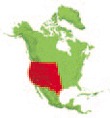DK People & Places: Western US
Beyond the Mississippi valley, the western US rises gently through the vast expanses of the Great Plains until it reaches the Rocky Mountains. The land then drops down again to the coastal ranges and plains of the Pacific coast, where there are forests, orchards, and farms, as well as deserts and rocky, flat-topped hills. Most people live in the southwestern states, or in cities along the Pacific coastline.

Cable cars run throughout the hilly California city of San Francisco. The cars fasten on to a constantly moving wire cable, gripping it tightly on the way up a hill, and then releasing it to glide down the other side.
The Pacific coast is hugely productive. Its soils are rich, its rivers provide extensive irrigation, and the sun shines all year. Apples are grown in Washington State, while California produces vegetables and citrus fruit, as well as Napa Valley grapes that make some of the best wines in the world.
Los Angeles is the center of a sprawling, developed area with a total population of 15 million people. Public transportation is limited, so everyone travels by car. As the city is sandwiched between the coast and a ring of surrounding mountains, air pollution is extremely high.
The American Indians who once wandered freely across the whole of the US, hunting buffalo and living off the land, now live mainly on reservations. Here, they control their own affairs, but the land is often poor and jobs scarce, so many leave the reservations to live and work elsewhere.
The San Andreas, San Fernando, and Santa Monica fault lines cause frequent earth tremors and sometimes earthquakes, especially in the San Francisco area. Long periods without rain often lead to serious bush fires that threaten the West Coast’s big cities, and flooding is a major problem because of sinking coastal areas.
Sheltered by mountains from the Pacific coastline are some of the driest, hottest regions of North America. One of these, Death Valley in California, has very little rainfall, and temperatures that soar to 134°F (57°C). Its landscape is bleak but magnificent, attracting tourists to see its many canyons and strange rock formations.
The wealth of Texas comes mainly from oil, which was discovered there in 1901. As well as being the second-largest oil-producing state in the US after Alaska, Texas is rich in iron ore, magnesium, uranium, and other minerals. Cattle ranching and cotton farming also help make it one of the wealthier states.
The Grand Canyon is the largest land gorge on Earth, and is easily visible from space. The canyon runs through northern Arizona and is more than 1 mile (1.6 km) deep and 277 miles (446 km) long. It was formed by the Colorado River cutting through a rocky plateau for over a million years, exposing at its lowest point some of the oldest rocks in North America.

